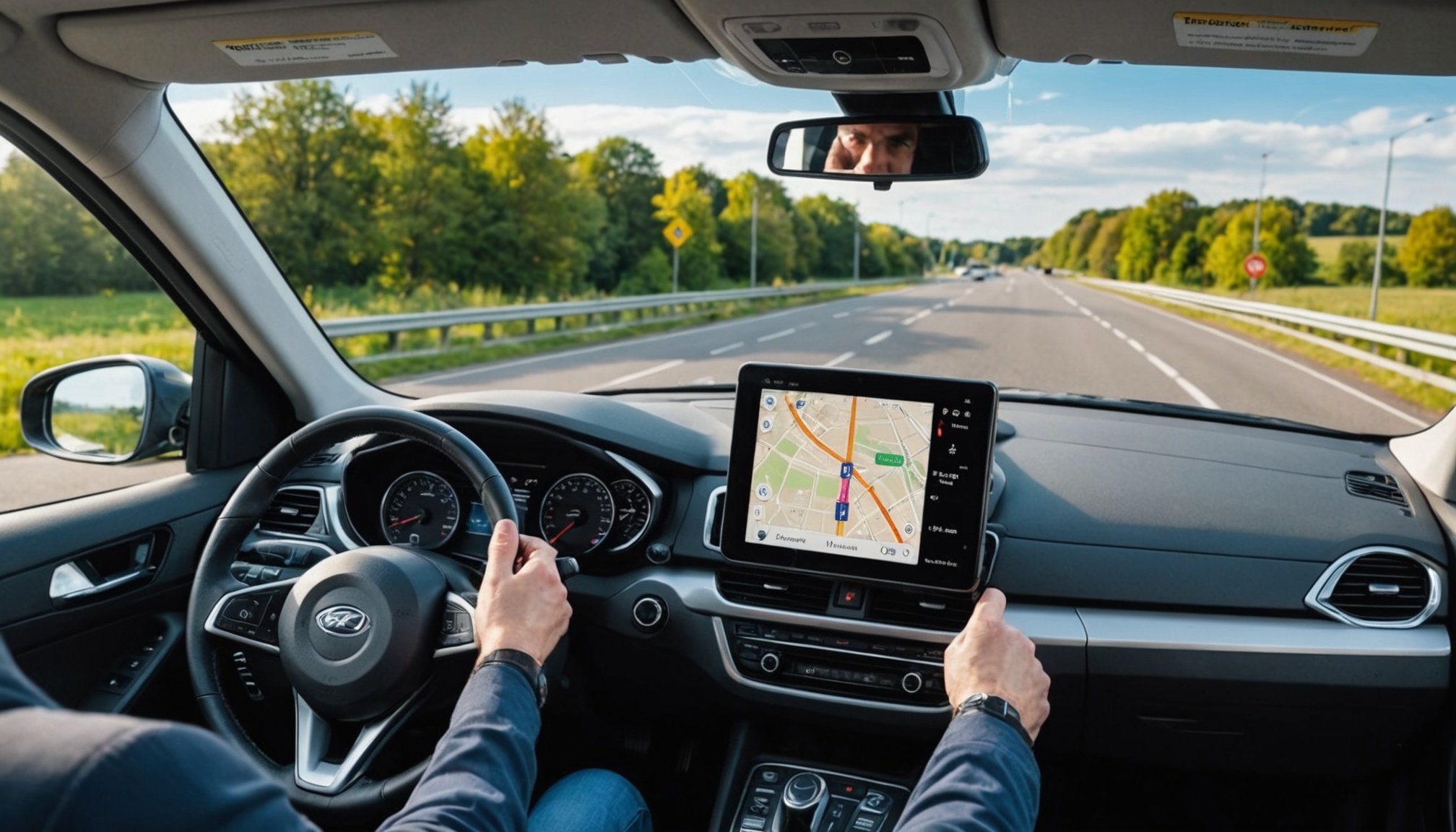Overview of Car GPS Tracking Systems in the UK
When considering car GPS tracking systems, understanding their role in vehicle security is essential. These systems use satellite technology to monitor and report the location of vehicles, providing a robust security solution for owners. In 2023, the UK market sees significant advancements influenced by innovations in tracking technology. This technological shift aims to enhance efficiency and user experience in tracking systems.
Trends in the current market lean towards improved usability, driven by features such as real-time updates and broader tracking coverage. Today’s 2023 technology emphasizes seamless integration with smartphones, offering vehicle owners unprecedented control and peace of mind.
Also read : Essential Navigation System Features UK Drivers Need for the Perfect Urban Commute
The primary benefits of using GPS tracking systems include enhanced vehicle security and quick recovery in theft-related scenarios. With increasing concerns about vehicle theft, these systems provide a preventive measure, acting as a deterrent to crime. They also support fleet management with features to monitor vehicle location and driver behaviours effectively. Furthermore, these systems can result in insurance savings, as some providers offer discounts to vehicles equipped with GPS tracking.
Simply put, car GPS tracking systems are an investment towards a more secure and intelligent approach to vehicle management in the UK.
In parallel : Maximize your electric vehicle”s range this winter: essential driving tips for uk motorists
Top Car GPS Tracking Systems of 2023
In the UK, there is a variety of choices among the best car GPS trackers for 2023. Here, we evaluate three top picks based on their features, pricing, and user reviews.
System 1: TrackerOne
- Key features and specifications: TrackerOne offers real-time tracking, geofencing, and speed alerts. Its user interface is intuitive, ideal for tech-savvy and non-tech users alike.
- Pricing and subscription options: Prices start at £100 with a basic monthly subscription of £10, offering flexibility with yearly plans for frequent users.
- User experiences and ratings: Garnering a 4.5-star rating, users praise the accuracy and customer support, making it a popular choice among UK vehicle owners.
System 2: NavPro
- Key features and specifications: Known for its extensive coverage areas and integration with multiple devices, NavPro also includes theft detection alarms.
- Pricing and subscription options: Costing around £150, it comes with a £12 per month fee, providing premium features at competitive pricing.
- User experiences and ratings: With a 4-star average, users appreciate its comprehensive features, though some desire improved app interfaces.
System 3: SecureTrack
- Key features and specifications: SecureTrack highlights real-time updates and driver behaviour reports. Its robust build ensures durability.
- Pricing and subscription options: At £120 with a £9 monthly fee, it appeals to those prioritising budget without compromising quality.
- User experiences and ratings: Holding a steady 4.3-star rating, feedback highlights its ease of installation but notes occasional GPS lags.
Detailed Comparison of Features
This section focuses on a comprehensive GPS tracking comparison by analysing key features and benefits associated with choosing the best systems.
Feature Comparison and Analysis
A thorough comparison reveals that all top car GPS trackers in 2023 offer real-time tracking. However, differences arise in accuracy and coverage. TrackerOne and NavPro deliver expansive coverage, ideal for users needing frequent updates across wide areas. SecureTrack maintains a balance with reliable tracking but faces occasional issues with signal in remote locations.
In terms of additional features, geofencing capabilities are prominent in TrackerOne and NavPro, providing boundary setting for vehicle movement. SecureTrack exhibits strength in offering behaviour reports and alerts, appealing to users interested in monitoring driving habits.
Evaluating Advanced Functions
Advanced functions such as theft detection and alarm systems are critical. NavPro stands out with robust anti-theft alarms, while TrackerOne provides efficient alerts linked to smartphones, enhancing immediate responses. SecureTrack focuses on comprehensive driver behaviour analysis, assisting fleet managers in improving safety and efficiency.
Choosing a GPS tracking system largely depends on specific needs: TrackerOne excels in user interface design, NavPro offers unparalleled coverage, and SecureTrack is preferred for its driver analysis features. Each presents unique strengths, ensuring diverse preferences and requirements are effectively met.
Benefits of Using GPS Tracking Systems
Car GPS tracking systems offer substantial benefits, primarily enhancing vehicle safety. A key advantage is improved vehicle recovery in theft situations. Once a vehicle’s location is tracked in real-time, authorities can respond promptly, bolstering recovery rates significantly. This technological assistance acts not only as a deterrent but also enables swift action when theft occurs.
Real-time tracking provides vehicle owners with continuous updates, fostering peace of mind. This constant surveillance ensures drivers know their vehicle’s exact location, allowing for immediate alerts if unexpected movements occur. This feature is not only crucial for personal vehicles but also indispensable for fleet management, where multiple vehicle tracking is crucial for operational efficiency.
Moreover, these systems assist in monitoring driving habits, thus promoting safer driving. By providing insights into driver behaviours such as speed, braking, and route choice, GPS trackers encourage responsible driving. This information is vital for fleet managers aiming to enhance road safety and reduce accidents.
In summary, GPS tracking systems are invaluable for maintaining vehicle security, offering users comprehensive safety advantages that extend beyond mere location tracking. Through real-time monitoring and behavioural insights, they build a robust framework for safer, more secure vehicle operation.
Installation and Setup Process
The process of installing a car GPS tracking system can significantly impact its performance and user experience. Understanding the steps involved is crucial.
Step-by-Step Installation Processes
Most systems come with a GPS installation guide. The installation can be a straightforward DIY task or might require professional assistance. Factors influencing this decision include complexity of the device and user familiarity with vehicle electronics. For a seamless installation, ensure the device is easily accessible but discreetly placed. This maximizes effectiveness while protecting against tampering.
Professional vs. DIY Installation
Opting for professional installation ensures a correct setup by experts, reducing potential errors. However, it often incurs additional costs. DIY solutions offer a cost-effective alternative. They can be quite rewarding but require following setup instructions meticulously to guarantee functionality.
Tips for Optimal Placement and Settings Adjustments
Proper placement enhances performance. It’s advisable to position the tracker where GPS signals are unobstructed, such as under the dashboard. Settings adjustments depend on individual needs; fine-tune alerts and notifications to focus on important updates without being overwhelmed.
Understanding the nuances of installation and personal preferences can lead to better functionality and satisfaction. It’s important to balance ease, performance, and cost when deciding between DIY and professional services.
Legal Considerations and Regulations
When using car GPS tracking systems, understanding UK laws is crucial to ensure compliance. GPS tracking laws outline how tracking can be conducted legally, focusing on consent and privacy. Vehicle owners must obtain explicit consent before tracking others’ vehicles. This ensures that privacy concerns are respected, limiting data misuse. Failing to do so can lead to legal repercussions under data protection regulations, such as the Data Protection Act 2018.
Additionally, users must be aware of regulations surrounding vehicle tracking regulations, which dictate how information gleaned from tracking can be shared or used. These rules safeguard against privacy invasion and data exploitation, offering guidelines for ethical GPS tracking practices.
Practising responsibility involves understanding how data storage and data sharing affect personal privacy. Users are encouraged to regularly review privacy policies of their tracking systems to understand data handling practices fully. Ensuring the system adheres to these standards protects both the vehicle owner’s rights and those of any other tracked individuals.
Engaging in best practices includes regular audits of tracking use, updated consent for any changes in purpose, and being transparent about data use, fostering trust and legal security in employing GPS tracking systems.
Buying Guide for Car GPS Tracking Systems
Selecting the right GPS tracker involves considering several crucial factors to meet your needs effectively. Here’s a breakdown to guide your decision.
Begin by assessing the key features. Prioritise those that enhance vehicle security, such as real-time tracking, geofencing capabilities, and theft alerts. Ensure compatibility with your vehicle and check if it supports integration with your smartphone, crucial for seamless updates.
Next, explore warranties and customer support. Reliable GPS tracking systems often come with robust warranties, reflecting their durability and manufacturer’s confidence. Customer support ensures assistance when help is needed, adding peace of mind.
Budget is another vital consideration. Evaluate different subscription models offered by providers. Some systems use a one-time purchase model with no additional fees, while others operate on monthly or yearly subscriptions. Balance cost-effectiveness with the features essential to you.
Finally, review additional best practices. Thoroughly research user testimonials and unbiased UK reviews, as these provide insights into real-life applications. Consumers frequently highlight ease of installation and the quality of app interfaces, bridging the gap between technology and user experience.
User Recommendations and Reviews
Understanding user reviews of car GPS tracking systems is crucial for potential buyers. They offer insights from real-life applications, providing an authentic glimpse into each product’s performance.
Across various review platforms, users consistently highlight the importance of customer testimonials when choosing a tracking system. Praise often revolves around ease of installation and the intuitive design of tracking interfaces, reflecting satisfaction with user-friendly solutions. Many highlight the efficiency of real-time tracking, noting its effectiveness in enhancing vehicle security and peace of mind.
Conversely, common cons include occasional issues with GPS signal quality, particularly in remote areas. Consumers suggest ensuring the chosen system offers reliable coverage, especially for those frequently travelling through less populated locations. Some dissatisfaction also arises from unexpected subscription fees, emphasising the need for clear pricing structures.
A recurring theme in feedback is the desire for comprehensive customer support, which many find critical for resolving technical difficulties. Systems offering robust assistance score higher in user satisfaction, underlining the importance of accessible help. In summary, thoughtful consideration of user feedback can guide buyers in selecting a GPS tracker that meets their specific needs and expectations.
Buying Guide for Car GPS Tracking Systems
Choosing the right GPS tracker requires careful consideration of several factors to fit your unique needs. Begin by prioritising key features such as real-time tracking, geofencing, and theft alerts that boost vehicle security. Ensure compatibility with your vehicle and integration with smartphones for seamless updates, essential for ensuring a user-friendly experience.
Investigate the warranty offers and customer support services that accompany the tracker. Robust warranties indicate product durability and manufacturer’s confidence. Effective customer support ensures that assistance is available when needed, enhancing the overall experience and reliability.
Consider your budget and explore different subscription models. Some GPS tracking systems offer one-time purchases without additional costs, while others require monthly or annual fees. Balance cost-effectiveness with essential features to ensure you’re investing wisely.
Moreover, scrutinise user testimonials and independent UK reviews for insights into real-world applications. Consumers frequently consider ease of installation and app interface quality crucial, as these aspects bridge the gap between technological capability and user interaction.
This buying guide aims to equip you with the knowledge necessary to make informed decisions, ensuring your chosen car GPS tracking system fully supports your vehicle management and security aims.











